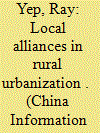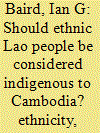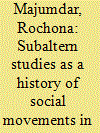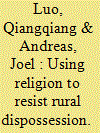| Srl | Item |
| 1 |
ID:
173250


|
|
|
|
|
| Summary/Abstract |
The relocation of peasants to high-rise buildings is the latest strategy deployed to feed the insatiable hunger for land in China. To free up more land for construction, Chinese peasants are encouraged to abandon their traditional homes and move into newly built high-rise modern apartments. A central feature of this distinctive form of rural urbanization is the transferability of land development rights across the rural–urban divide. Like most policy initiatives in Chinese economic reforms, variations and improvisation in implementation are found across local administrations. Such local disparities carry major implications for rural governance. This article compares and evaluates the experience of local governments in Chongqing and Nantong. Local governments in these two localities face both opportunities and constraints in integrated urban–rural development, a situation which has contributed to contrasting relocation patterns, and consequently variations in intergovernmental relationships at local levels. Enjoying the privilege of experimenting with the ‘land bill’ (地票) system, local governments in Chongqing have more leeway to stake their claims and are thus in a better position to maintain their authority. In the Nantong case, however, the more hands-on approach of the prefecture deprives lower administrative levels of flexibility to pursue their interests. This contrast in the policy process leads to different patterns of collaboration between levels of government at the grass roots in the two localities, which may also have a long-term impact on the exercise of authority at the community level.
|
|
|
|
|
|
|
|
|
|
|
|
|
|
|
|
| 2 |
ID:
145851


|
|
|
|
|
| Summary/Abstract |
The ethnic Lao are not well-known in Cambodia, despite constituting a substantial but unrecorded population there. Even though the Lao have lived in Cambodia for many generations, they were excluded from being considered ‘indigenous peoples’ when the category was legally introduced to Cambodia through the 2001 land law. Instead, they are not classified as ‘ethnic Lao’, except for the very few who were actually born in Laos. Here, I consider how the politics of identity in Cambodia has separated some highland ethnic minorities from the Lao. Many ethnic Lao in Cambodia quietly disagree with not being classified as indigenous. This contestation represents a similar dynamic to the differences of opinion between the Asian Indigenous Peoples Pact (AIPP) and the peasant organization, La Via Campesina, regarding advocating for indigenous and peasant rights, respectively. My objective is to demonstrate that the politics of indigenous categorization in Cambodia is complicated and fraught.
|
|
|
|
|
|
|
|
|
|
|
|
|
|
|
|
| 3 |
ID:
137261


|
|
|
|
|
| Summary/Abstract |
While there is a thriving sociological and historical literature on social movements in post-colonial India, popular mobilisations of the colonial period are rarely addressed in terms of social movements. But the historical record is replete with instances of countless mobilisations seeking change against the state and other forms of authority in colonial society. This essay analyses a select group of works by the historical collective, Subaltern Studies, with the explicit goal of seeing these works as histories of social movements in colonial India. It also argues that one of the lasting legacies of the collective's writings was to present us with a paradigm, not unchallenged, of the revolutionary subject of such movements. By focusing in particular on Ranajit Guha's early writings, I present a reading of the colonial Indian peasant as this paradigmatic rebel subject.
|
|
|
|
|
|
|
|
|
|
|
|
|
|
|
|
| 4 |
ID:
146518


|
|
|
|
|
| Summary/Abstract |
In this paper, we examine the role played by religion in a struggle waged by Hui Muslim villagers against land expropriation. Religion can provide powerful resources for protest movements, especially for religious minorities, but it can also be dangerous. This is particularly true in China where the state has had little toleration of autonomous organization and has long been suspicious of religious organization, especially among ethnic minorities. Scholarly literature about collective action by religious minorities in China has focused on protests about cultural and political issues – and the repression of such protests – but there has been relatively little scholarship about protests by religious minorities over economic issues. The number of protests over economic conflicts has increased in recent years, and the state has been more tolerant of economic than of political protests. These conditions have shaped the following questions: what happens when villagers employ religious ideas and use religious organization to advance economic demands? How effective are religious ideas and organization as tools of mobilization? How do government authorities respond?
|
|
|
|
|
|
|
|
|
|
|
|
|
|
|
|